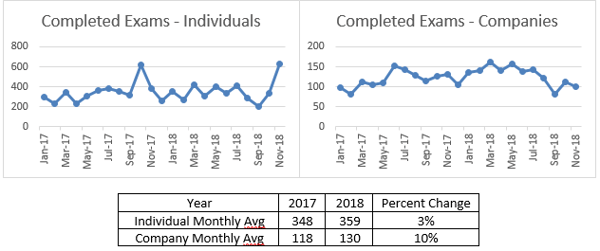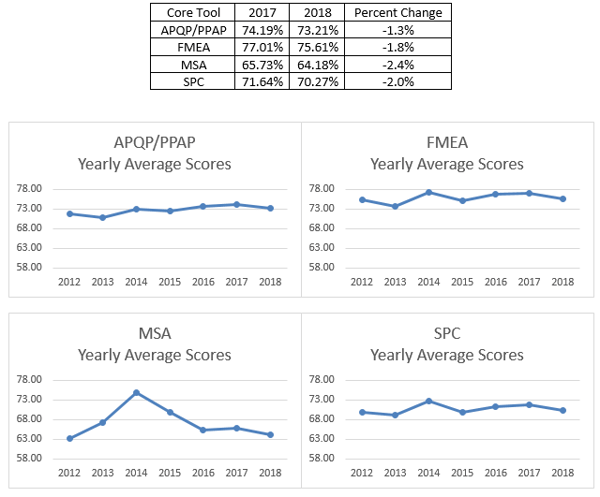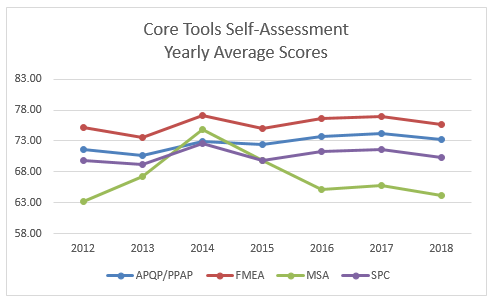
In 2012, AIAG introduced the Core Tools Self-Assessment (CTSA) as a means to measure an individual’s Core Tools proficiency and identify areas for improvement. The CTSA is a timed, open book self-assessment that covers APQP/PPAP, FMEA, MSA and SPC and is offered in eight different languages. Exam questions are tied to the proctored Core Tools certification exams offered by AIAG.
A single user is eligible to complete the self-assessment once every 30 days, allowing individuals to address deficiencies through training and monitor their improvement when reassessing their knowledge. After completing the assessment, participants receive their confidential results via e-mail.
Year to date through November 2018, the number of completed exams has increased 3% when compared through November 2017, as an average of 359 individuals per month completed the exam in 2018 (compared to 348 individuals per month in 2017).
Additionally, the number of organizations completing the CTSA increased 10% – 130 companies per month in 2018 compared to 118 companies per month in 2017 – providing insight to more companies about the Core Tools competency of their quality professionals. Monthly take rate trends and averages are included below:

Earlier in 2018, AIAG identified a negative CTSA scoring trend: average test results for all four sections of the CTSA decreased between 1.3% and 2.4% from the 2017 averages, reversing the previously positive trend for three of the four Core Tool assessments. MSA, the only Core Tool assessment without a trend change, registered its second-lowest yearly average score (64.18%) since the introduction of the CTSA in 2012. Additionally, 2018 average scores for all four Core Tools were below the lifetime average scores. On a positive note, however, average monthly scores for both MSA and SPC increased during the second half of 2018.
Year to date CTSA averages through November 2018 are below, with lifetime score average trends presented graphically:


What does this mean? Even though average CTSA scores have decreased, the increasing number of individuals completing the CTSA is positive, as it provides a broader picture of the industry’s Core Tools proficiency. These scores also reveal how effectively an organization is transferring knowledge to incoming quality professionals.
The decrease of Core Tool proficiency adds risk to the industry as the pressure for speed, performance and technology continues to increase. Exposing lower proficiency scores, however, allows individuals to address their deficiencies through training and improve their Core Tools competency.
Core Tools competency helps organizations meet industry demands by providing the foundation for employees to improve the performance of their products and processes. To support that, AIAG provides anonymous Core Tools self-assessment score summaries to AIAG member companies upon request, allowing the organization to identify their Core Tools strengths and weaknesses as well as scoring trends and correlations.
Organizations and individuals that want to improve their Core Tools competency are encouraged to take AIAG’s free Core Tools Self-Assessment to identify their areas of strength and weakness.
For more information and (free!) resources – as well as links to AIAG Core Tools training courses – visit our Automotive Core Tools page.


